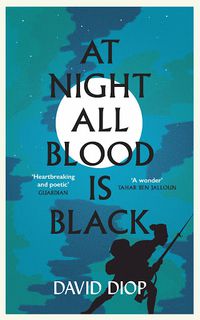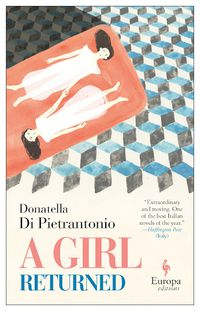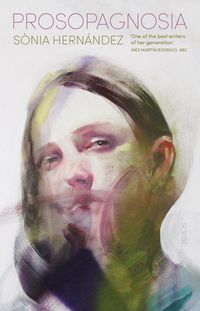We’re recommending some recently released fiction in translation. Fiction in translation is the perfect way to explore our world, while we’re staying in place.
Girls Against God by Jenny Hval (translated by Marjam Idriss)
Welcome to 1990s Norway. White picket fences run in neat rows and Christian conservatism runs deep. But as the Artist considers her past, her practice and her hatred, things start stirring themselves up around her.
In a corner of Oslo a coven of witches begin cooking up some curses. A time-travelling Edvard Munch arrives in town to join a death metal band, closely pursued by the teenaged subject of his painting Puberty, who has murder on her mind. Meanwhile, out deep in the forest, a group of school girls get very lost and things get very strange. And awful things happen in aspic.
Jenny Hval’s latest novel is a radical fusion of feminist theory and experimental horror, and a unique treatise on magic, writing and art.
At Night all Blood is Black by David Diop (translated by Anna Moschovakis)
Alfa diaye and Mademba Diop are two of the many Senegalese tirailleurs who fight in the Great War under the French flag. Whenever Captain Armand blows his whistle they climb out of their trenches to attack the blue-eyed enemy. But one day Mademba is mortally wounded, and without his friend, his more-than-brother, Alfa is alone amidst the savagery of the trenches, far from all he knows and holds dear. He throws himself into combat with renewed vigour, but soon he begins to scare even his own comrades in arms.
Here David Diop captures the tragedy of a young man’s mind hurtling towards madness and tells the little-heard story of the Senegalese who fought for France on the Western Front.
Little Eyes by Samanta Schweblin (translated by Megan McDowell)
They look harmless enough - you could even call them cute. A cuddly panda, a brightly-coloured dragon, a miniature crow. They’re part of the latest craze exploding from Croatia to Norway to Brazil - they are ‘Kentukis’.
Not quite a phone, not quite a toy, not quite a robot, Kentukis contain cameras which allow someone on the other side of the planet to access the most intimate moments of another person’s life. And it doesn’t take long for these apparently innocent devices to fall prey to our dark obsession with technology.
A Girl Returned by Donatella Di Pietrantonio (translated by Ann Goldstein)
I was the Arminuta, the girl returned. I spoke another language, I no longer knew who I belonged to. The word ‘mama’ stuck in my throat like a toad. And, nowadays, I really have no idea what kind of place mother is. It is not mine in the way one might have good health, a safe place, certainty. Without warning or a word of explanation, an unnamed 13-year-old girl is sent away from the family she has always thought of as hers to live with her birth family: a large, chaotic assortment of individuals whom she has never met and who seem anything but welcoming.
Thus begins a new life, one of struggle, conflict, especially between the young girl and her mother, and deprivation. But in her relationship with Adriana and Vincenzo, two of her newly acquired siblings, she will find the strength to start again and to build a new and enduring sense of self.
There’s No Such Thing As An Easy Job by Kikuko Tsumura (translated by Polly Barton)
A young woman walks into an employment agency and requests a job that requires no reading, no writing - and ideally, very little thinking.
She is sent to a nondescript office building where she is tasked with watching the hidden-camera feed of an author suspected of storing contraband goods. But observing someone for hours on end can be so inconvenient and tiresome. How will she stay awake? When can she take delivery of her favourite brand of tea? And, perhaps more importantly - how did she find herself in this situation in the first place?
As she moves from job to job, writing bus adverts for shops that mysteriously disappear, and composing advice for rice cracker wrappers that generate thousands of devoted followers, it becomes increasingly apparent that she’s not searching for the easiest job at all, but something altogether more meaningful…
Prosopagnosia by Sonia Hernandez (translated by Samuel Rutter)
Fifteen-year-old Berta says that beautiful things aren’t made for her, or that she isn’t destined to have them, or that the only things she deserves are ugly. It’s why her main activity, when she’s not at school, is playing the ‘prosopagnosia game’ - standing in front of the mirror and holding her breath until she can no longer recognise her own face. An ibis is the only animal she wants for a pet.
Berta’s mother is in her forties. By her own estimation, she is at least twenty kilos overweight, and her husband has just left her. Her whole life, she has felt a keen sense of being very near to the end of things. She used to be a cultural critic for a regional newspaper. Now she feels it is her responsibility to make her and her daughter’s lives as happy as possible.
A man who claims to be the famous Mexican artist Vicente Rojo becomes entangled in their lives when he sees Berta faint at school and offers her the gift of a painting. This sets in motion an uncanny game of assumed and ignored identities, where the limits of what one wants and what one can achieve become blurred. Art, culture, motherhood, and the search for meaning all have a part to play in whether Sonia Hernandez’s characters recognise what they see within.
Three O'Clock in the Morning by Gianrico Carofiglio (translated by Howard Curtis)
Antonio is on the cusp of adulthood, trying to work out who to be and what to do. His father, once a brilliant mathematician, hasn’t figured much in his son’s life since the divorce from Antonio’s mother, a beautiful and elusive woman. A diagnosis of epilepsy and hope for a cure takes father and son to Marseille, where they must spend two days and two nights together, without sleep. In a foreign city, under strained circumstances, they get to know each other and connect for the first time.
Elegant, warm and tender, set against the vivid backdrop of 1980s Marseille and its beautiful calanques, Three O'Clock in the Morning is an unforgettable story about illusions and regret, about talent and the passage of time and, most of all, about love.









